Table of Content
Are you looking for the best blogging platform ? Look no further!
In this blog post, you will discover the top ones that are free and that allow you to launch your blog for free to share your works and ideas on the web.
The best blogging platforms well equipped
The best self-hosted blogging platforms
WordPress.org
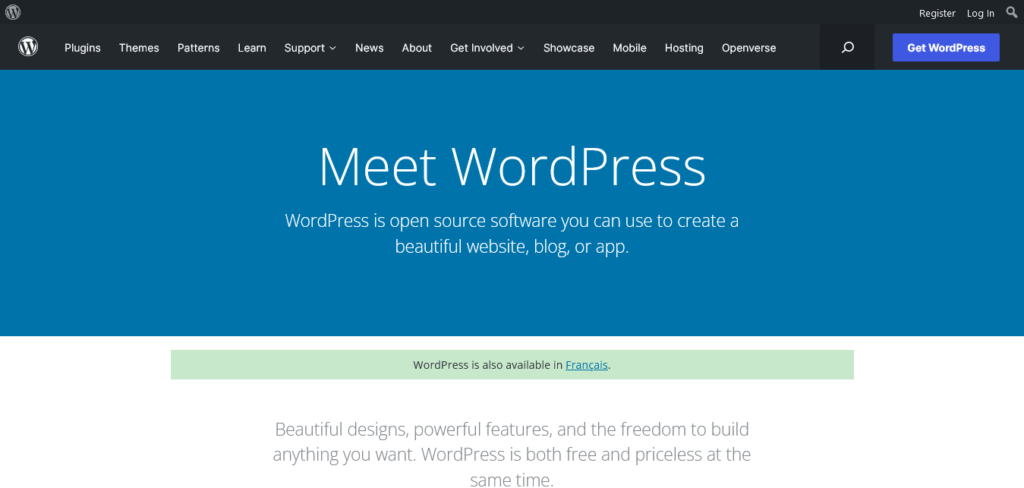
WordPress is the most popular and widely used blogging platform.
More than 40% of active websites on the internet are powered by WordPress. It is highly regarded for its scalability and ease of use.
The wordpress.org address is the directory for free WordPress themes, free WordPress plugins and the WordPress software (the WordPress Content Management System).
WordPress is open source and has a very active community. It is one of the few tools that have an abundance of free resources available.
STAY WITH US – REST OF THE POST AFTER THIS PRESENTATION
Divi, the most popular WordPress theme, with almost 1,000,000 downloads.
It includes the following features :
Its Advantages:
- Apart from a blog, you can use it to create any type of website
- It is a very simple software that you can master quickly, it is also easy to find help
- You have full control over your blog or website
- Numerous themes of any type of niche are available to allow you to create a site quickly, and also you can extend the functionality of your website using one of the tens of thousands of extensions offered
- It is a search engine friendly software that has plugins designed specifically for SEO
Disadvantages:
- It takes some practice before you can create a blog or website properly with WordPress especially if you are beginner
- You need to check some plugins before installing and activating them, as many of them are of poor quality and can make your site or blog vulnerable
- It is up to you to take care of the security and backups of your website
Drupal
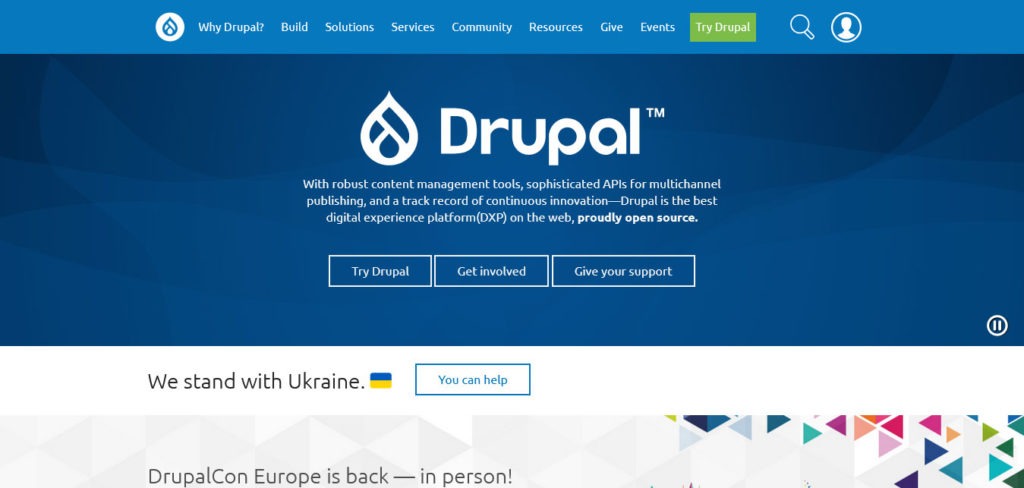
Citing the best blogging platforms without mentioning Drupal is a big mistake. It is the second most used Content Management System in the world.
It is also an open source project.
Unlike WordPress, it is difficult to master. You have to follow a certain learning curve and do several practices before you can design blogs and websites with Drupal.
It has a basic editor, and an administration interface protected by a login page. It offers the possibility of advanced content planning.
Benefits:
- Drupal offers flexible custom content types
- It has a very flexible taxonomy system, which allows to handle a lot of content
- Drupal supports multilingual sites, you don’t need to use a plugin because multilingual features are built into the Drupal source code
- Drupal offers you the possibility to create new roles with individual permissions for users
- It is very secure
Disadvantages :
- Its administration area is not intuitive
- It is a bit more difficult to learn than WordPress
Joomla

Joomla shares many common points with WordPress and Drupal.
It is flexible, open source, extensible thanks to its plugins.
This blog platform also has several pre-built templates that facilitate the design of a blog or a website.
Advantages:
- It offers excellent options for user management
- It offers multilingual support, no need to use an extension to enjoy this feature
- It is easy to use
Disadvantages:
- Its management interface is not aesthetic
- It has few pre-built templates and quality plugins
Pyro

Unlike the previous ones, Pyro is less known, but it is one of the best blog platforms.
It is an open source project designed with the PHP Laravel framework, its basic features are 100% free.
Its control panel is user-friendly and modern, it is easy to handle.
It allows you to easily manage your content wherever you are, its control panel is responsive, which allows you to administer your website from a smartphone.
Its disadvantages are the expensive prices of these extensions and the obligation to master PHP code before adding advanced features.
Textpattern
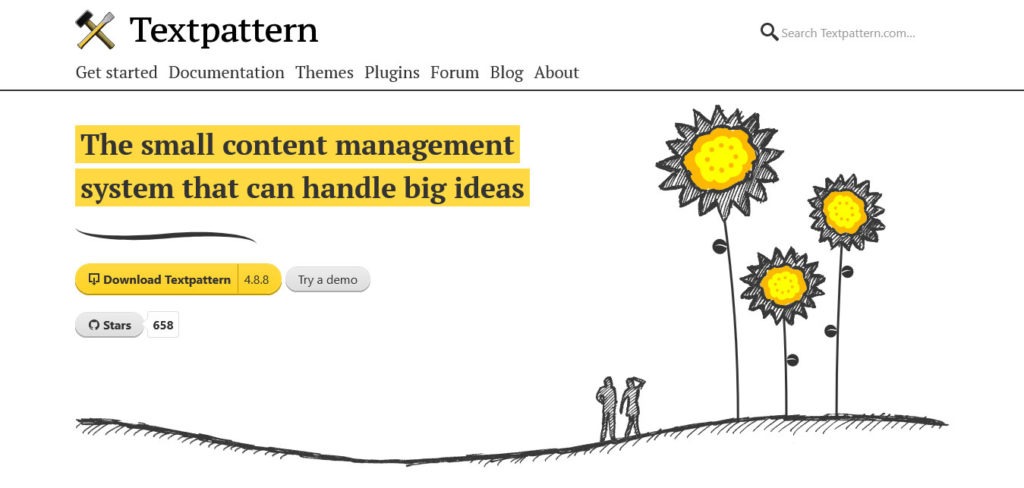
Among these best blogging platforms, Textpattern is the easiest.
It is flexible, robust and reliable Content Management System.
It has a powerful and sophisticated engine. From its control panel, you can manage HTML, CSS, JavaScript codes and extend its functionality with the help of available plugins.
Advantages:
- It is the simplest and lightest blogging platform
- It supports Textile and Markdown formatting languages
Disadvantages:
- For a complete mastery of this CMS, you need to have technical knowledge in web development and master the formatting languages Textile and Markdown
THE REST AFTER THIS AD
Subrion
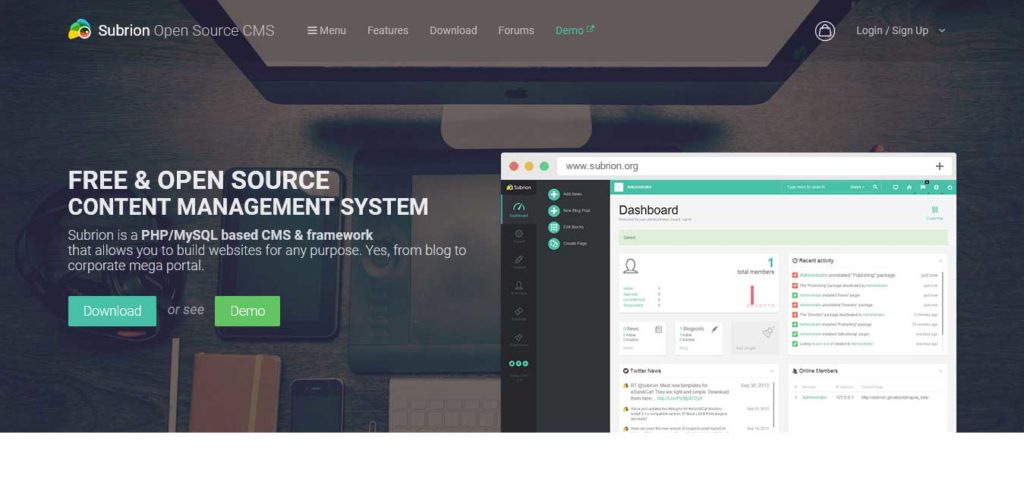
Subrion is also a self-hosted blogging platform with a slightly similar style to WordPress.
It incorporates excellent features making it easy for users to create a blog or site and submit it to search engines.
It has basic pre-built templates and extensions to extend the functionality.
Its disadvantage is that its add-ons are not available in abundance like other blog platforms such as WordPress.
The best hosted blog platforms
Wix

Wix is a website host that provides a site builder for bloggers and small business owners.
Its site builder allows you to drag and drop section blocks, this is very handy for those who don’t want to mess with code or any novice who wants to take charge of making their blog or site themselves.
This blogging platform now has more than 100 million users.
It offers a free version and a paid version
Advantages:
- Pre-built templates are provided to create a site in a few clicks
- The handling of its page builder is simple
Disadvantages:
- The free version is very limited
- No way to change the template after making a choice
- The integrated features for an e-commerce site are limited
WordPress.com

WordPress.com is a hosting service offered by Automattic, the company that publishes the WordPress CMS.
With this blog platform, you just need to register and choose a domain name to take advantage of their service.
It is free, but offers features and options that are paid.
Advantages:
- No configuration is required
- It is easy to use
- It is free
Disadvantages:
- The free version gives you only one sub-domain (https://example.wordpress.com)
- The options of the free version are very limited
- In the free version, it displays ads on your site without your consent
- With the free version, your account can be suspended if you violate their terms of service
Blogger

This blogging platform is owned by Google, and it is completely free.
It has interesting features to help anyone without technical knowledge who wants to start a blog.
Advantages:
- It is completely free
- You don’t need to be an expert in writing code to use it
- It is robust and secure
Disadvantages:
- Its design options are limited, and its pre-built templates lack attractive design
- It does not have frequent updates or new features
- Your account can be suspended at any time without your consent
Tumblr
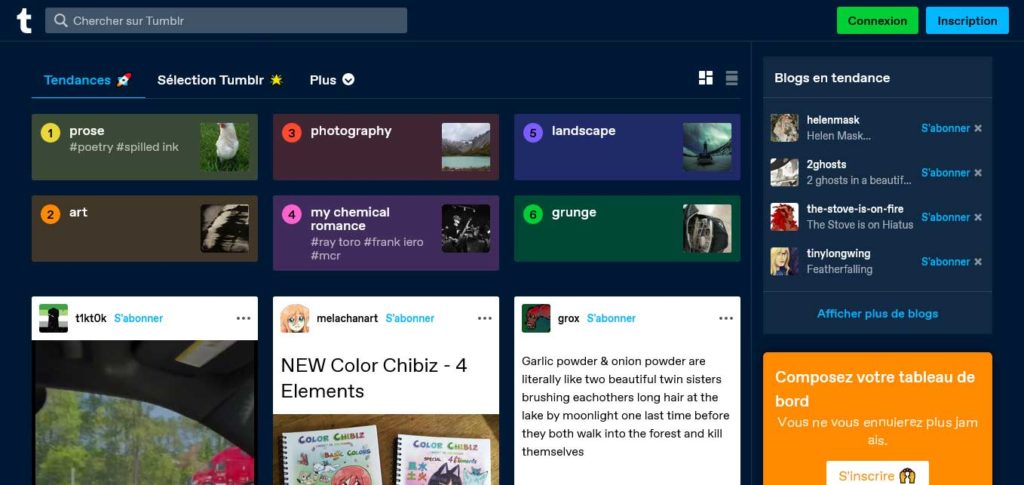
Tumblr is less popular than it was in its early days.
It is a micro-blogging platform with features such as following other blogs, built-in sharing tools and more. It is owned by Automattic.
Advantages:
- It is free with a Tumblr subdomain as https://example.tumblr.com
- It has a built-in social media component
- It is very easy to set up and use
Disadvantages:
- Its features cannot be extended if your blog does not grow
- It is difficult to backup your Tumblr blog or import it to other platforms
Medium

Medium is much more of a social platform than a blog platform.
It brings together a community of writers, journalists, bloggers, and experts.
Advantages:
- It allows you to focus on your content rather than on designing a blog
- It is easy to use, no technical knowledge required
Disadvantages:
- Your audience is under their control
- Your account can be deleted at any time if they feel you have violated their rules
LiveJournal

This blogging platform was one of the first to be created. It is owned today by a Russian media company.
It is a mix between a social network and a microblogging platform.
Advantages:
- It is easy to use
- It is free, and offers advanced features in paid version
Disadvantages:
- Non-intuitive interface
Other resources published on the blog
16 Best Free Website Mockup Tools
Beginner’s Guide : How to install Google Analytics in WordPress easily
20 best domain name generators to find an ideal domain for your business
40+ best responsive themes (wordpress, woocommerce, shopify, prestashop, drupal)

